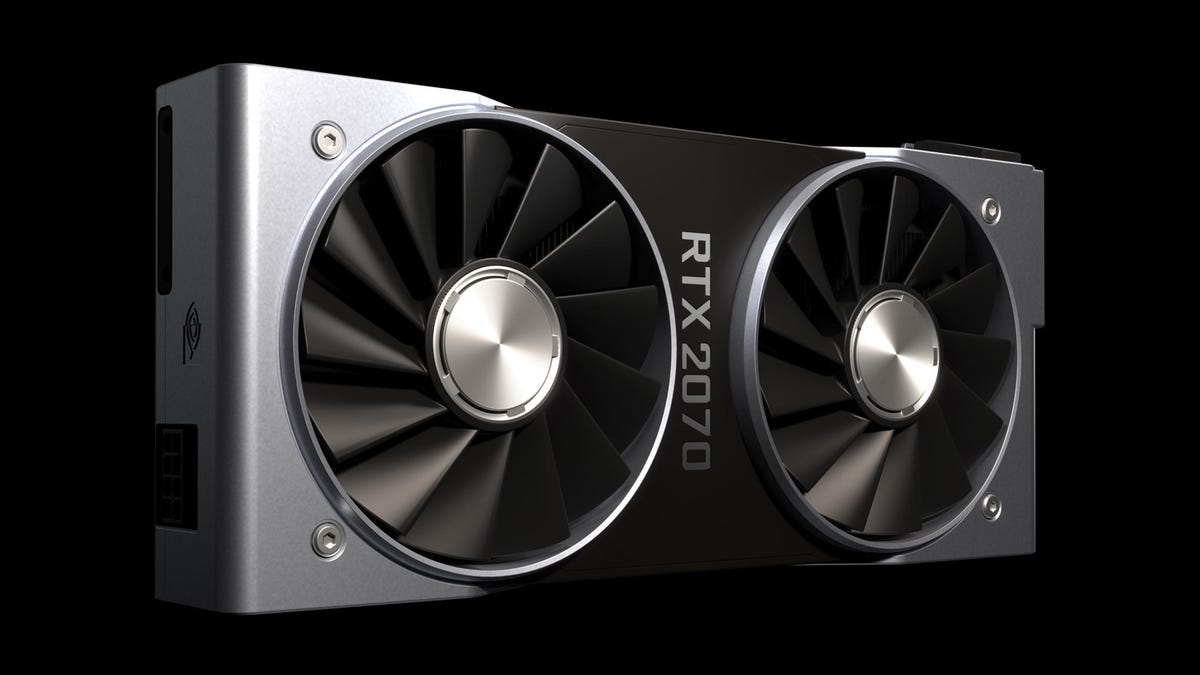Nvidia reveals $800 GeForce RTX 2080 at Gamescom 2018
Nvidia's new top-end graphics card is all about ray tracing.

Nvidia kicked off Gamescom 2018 with an announcement of the new Turing-based GeForce line of GPUs, the RTX 2080, RTX 2070 and RTX 2080 Ti. You can preorder cards now, and they're all slated to be available starting Sept. 20, with the exception of the $500 RTX 2070, which will be available in October.
On the keynote stage, CEO Jen-Hsun Huang alluded to the torrent of rumors leading up to the announcement, saying that "everything on the Web -- every spec -- is wrong." That may have been an overstatement -- especially given that Nvidia's own US website jumped the gun by posting photos, specs and pricing details before the official announcement.
Here are all the Turing-based card announcements Nvidia has delivered recently, including its workstation-targeted Quadro versions. It's interesting that Nvidia hasn't given a specification for the number of tensor cores in the consumer cards, despite emphasizing the capabilities during the announcement.
Comparative specifications
| GPU | Memory | Memory bandwidth | Clock Speed | Ray Tracing | RTX-OPS (trillions) | CUDA Cores | Tensor Cores | Price |
|---|---|---|---|---|---|---|---|---|
| GeForce RTX 2070 (reference) | 8GB GDDR6 | 448GB/sec | 1,410MHz | 6 Gigarays per second | 45 | 2,304 | n/a | n/a |
| GeForce RTX 2070 Founders Edition | 8GB GDDR6 | 448GB/sec | 1,710MHz (OC) | 6 Gigarays per second | 45 | 2,304 | n/a | $600 |
| GeForce RTX 2080 (reference) | 11GB GDDR6 | 616GB/sec | 1,545MHz | 8 Gigarays per second | 80 | 2,944 | n/a | $800 |
| GeForce RTX 2080 Ti (reference) | 11GB GDDR6 | 616GB/sec | 1,350MHz | 8 Gigarays per second | 78 | 4,352 | n/a | n/a |
| GeForce RTX 2080 Ti Founders Edition | 11GB GDDR6 | 616GB/sec | 1,635MHz (OC) | 10 Gigarays per second | 78 | 4,352 | n/a | $1,200 |
| GeForce Titan Xp (Pascal) | 12GB GDDR5X | 547.7GB/sec | 1,582MHz (boost) | n/a | n/a | 3,840 | n/a | $1,200 |
| Quadro RTX 5000 | 16GB GDDR6 | n/a | n/a | 6 Gigarays per second | n/a | 3,072 | 384 | $2,300 |
| Quadro RTX 6000 | 24GB GDDR6 | n/a | n/a | 10 Gigarays per second | n/a | 4,608 | 576 | $6,300 |
| Quadro RTX 8000 | 48GB GDDR6 | n/a | n/a | 10 Gigarays per second | n/a | 4,608 | 576 | $10,000 |
Nvidia historically hamstrings the GeForce cards from some workstation-class features (such as true 10-bit color support for photo editing), so it's more than just memory and CUDA cords that account for the huge price gaps between the two. All of the Turing-based cards support the new VirtualLink specification for VR headsets, though it's possible some manufacturers won't provide the actual USB-C connector, as well as DisplayPort 1.4 to drive 8K video.
Nvidia will also release non-Founders Edition versions of the new cards: the $1,000 GeForce RTX 2080Ti, the $700 GeForce RTX 2080, and the $500 GeForce RTX 2070. After showing a trailer for Battlefield V, which supports the new technology, Huang announced that the game will go into open beta on Sept. 6.
The big announcement was preceded by extensive remarks from Huang about the significance of the company's Turing enhancements. Nvidia's RTX technology adds new ray-tracing cores for high-quality, real-time rendering with global illumination, and the Tensor cores will speed up creating image detail quickly where there's none.
Ray tracing is the primary technology that's been used to create realistic rendering since the mid-1980s -- and with RTX, Nvidia says it has significantly reduced the most time consuming aspect of rendering. According to Huang, it would take 10 of Nvidia's previous-generation graphics card -- the GTX 1080Ti -- to keep up with Tensor.
Moments before the keynote started, NewEgg posted a promotion for the Nvidia GeForce RTX 2080 and 2080 Ti, showing models available from Asus , EVGA, Gigabyte, MSI, PNY, and Zotac.
The event was livestreamed from Cologne, Germany.
We're on the ground for Gamescom, so we'll bring you all the news as it happens from Cologne. Keep your eyes on our Gamescom hub for all the gaming info from the show floor.



